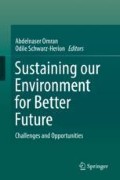Abstract
Drinking water contamination is to be considered as primary health concern in the present world. In developing countries like Pakistan, arsenic in drinking water has threatened more than 60 million individuals especially in the most populated province of Punjab. Present study aims to address this mass poisoning issue which has created severe health diseases in all age categories. An overview of present steps taken by the Government has also been reviewed under this discussion. Besides, some proposed solutions like legislative controls, governance, up to the mark sewerage system, treatment of industrial wastes, and anti-water pollution rules and regulations are also recommended. For the better sustainability of both environment and public health, serious attention is required from the relevant authorities to overcome this burning issue through recommended solutions.
Access this chapter
Tax calculation will be finalised at checkout
Purchases are for personal use only
References
Ahmed, A., Iftikhar, H., & Chaudhry, G. (2007). Water resources and conservation strategy of Pakistan. The Pakistan Development Review, 46, 997–1009.
Ahmed, A., Noonari, T., Magsi, H., & Mahar, A. (2013). Risk assessment of total and faecal coliform bacteria from drinking water supply of Badin city, Pakistan. Journal of Environmental Professionals Sri Lanka, 2(1), 46–57.
Ashbolt, N. J. (2004). Microbial contamination of drinking water and disease outcomes in developing regions. Toxicology, 198(1–3), 229–238.
Badar, M., Batool, F., Khan, S. S., Khokhar, I., Qamar, M., & Yasir, C. (2017, January–March). Effects of microcystins toxins contaminated drinking water on hepatic problems in animals (cows and buffalos) and toxins removal chemical method. Buffalo Bulletin, 36(1), 43–55.
Daud, M., Nafees, M., Ali, S., Rizwan, M., Bajwa, R. A., Shakoor, M. B., et al. (2017). Drinking water quality status and contamination in Pakistan. BioMed Research International, 2017.
DAWN. (2017). Pakistan concerned at arsenic poisoning. Retrieved January 15, 2018, from https://www.dawn.com/news/1353734
EPA. (2015). Consider the source: A pocket guide to protecting your drinking water (p. 52). Washington, DC: United States Environmental Protection Agency.
Guglielmi, G. (2017). Arsenic in drinking water threatens up to 60 million in Pakistan. Retrieved January 16, 2018, from http://www.sciencemag.org/news/2017/08/arsenic-drinking-water-threatens-60-million-pakistan
Hamid, A., Yaqub, G., Sadiq, Z., Tahir, A., & ul Ain, N. (2013). Intensive report on total analysis of drinking water quality in Lahore. International Journal of Environmental Sciences, 3(6), 2161–2171.
Hanna-Attisha, M., LaChance, J., Sadler, R. C., & Champney Schnepp, A. (2016). Elevated blood lead levels in children associated with the Flint drinking water crisis: A spatial analysis of risk and public health response. American Journal of Public Health, 106(2), 283–290.
Khan, S., Shahnaz, M., Jehan, N., Rehman, S., Shah, M. T., & Din, I. (2013). Drinking water quality and human health risk in Charsadda district, Pakistan. Journal of Cleaner Production, 60, 93–101.
Khan, K., Lu, Y., Saeed, M. A., Bilal, H., Sher, H., Khan, H., & Baninla, Y. (2017). Prevalent fecal contamination in drinking water resources and potential health risks in Swat, Pakistan. Journal of Environmental Sciences, 72, 1–12.
Kiani, K. (2015, December 5). Govt planning to introduce National Water Policy. Dawn, from https://www.dawn.com/news/1224730
Malik, A. (2017). Steps to water sustainability. Tribune, from https://tribune.com.pk/story/1417393/steps-water-sustainability/
Ministry of Environment. (2008). National Standards for Drinking Water Quality (NSDWQ) (pp. 1–41). Pakistan: Ministry of Health.
Mosley, W. H., & Chen, L. C. (1984). An analytical framework for the study of child survival in developing countries. Population and Development Review, 10, 25–45.
Nawab, J., Khan, S., Khan, M. A., Sher, H., Rehamn, U. U., Ali, S., & Shah, S. M. (2017). Potentially toxic metals and biological contamination in drinking water sources in chromite mining-impacted areas of Pakistan: A comparative study. Exposure and Health, 9(4), 275–287.
PCRWR. (2018). Regional centers. Retrieved January 15, 2018, from http://pcrwr.gov.pk/about.php?view_estab
Podgorski, J. E., Eqani, S. A. M. A. S., Khanam, T., Ullah, R., Shen, H., & Berg, M. (2017). Extensive arsenic contamination in high-pH unconfined aquifers in the Indus Valley. Science Advances, 3(8), 1–10.
Rasool, A., Xiao, T., Farooqi, A., Shafeeque, M., Liu, Y., Kamran, M. A., et al. (2017). Quality of tube well water intended for irrigation and human consumption with special emphasis on arsenic contamination at the area of Punjab, Pakistan. Environmental Geochemistry and Health, 39(4), 847–863.
Shah, M., Ara, J., Muhammad, S., Khan, S., & Tariq, S. (2012). Health risk assessment via surface water and sub-surface water consumption in the mafic and ultramafic terrain, Mohmand agency, northern Pakistan. Journal of Geochemical Exploration, 118, 60–67.
Shahid, N., Zia, Z., Shahid, M., Faiq Bakhat, H., Anwar, S., Mustafa Shah, G., & Rizwan Ashraf, M. (2015). Assessing drinking water quality in Punjab, Pakistan. Polish Journal of Environmental Studies, 24(6), 2597–2606.
Singh, G., Kaushik, S., & Mukherji, S. (2017). Revelations of an overt water contamination. Medical Journal Armed Forces India, 73(3), 250–255.
UNICEF. (2016). Pakistan annual report 2016 (pp. 1–66). Pakistan.
Waseem, A., Arshad, J., Iqbal, F., Sajjad, A., Mehmood, Z., & Murtaza, G. (2014). Pollution status of Pakistan: A retrospective review on heavy metal contamination of water, soil, and vegetables. BioMed Research International, 2014, 813206.
Wright, J., Gundry, S., & Conroy, R. (2004). Household drinking water in developing countries: A systematic review of microbiological contamination between source and point-of-use. Tropical Medicine & International Health, 9(1), 106–117.
Author information
Authors and Affiliations
Corresponding author
Editor information
Editors and Affiliations
Rights and permissions
Copyright information
© 2020 Springer Nature Singapore Pte Ltd.
About this chapter
Cite this chapter
Kamran, H.W., Omran, A. (2020). Water Contamination and Health Hazards in Pakistan: An Overview of the Current Scenario and Contemporary Challenges. In: Omran, A., Schwarz-Herion, O. (eds) Sustaining our Environment for Better Future. Springer, Singapore. https://doi.org/10.1007/978-981-13-7158-5_6
Download citation
DOI: https://doi.org/10.1007/978-981-13-7158-5_6
Published:
Publisher Name: Springer, Singapore
Print ISBN: 978-981-13-7157-8
Online ISBN: 978-981-13-7158-5
eBook Packages: Earth and Environmental ScienceEarth and Environmental Science (R0)

